
The liberal arts offer a famously broad spectrum of subjects and skills. So, the idea that you might specialize in something that is broad and diverse by definition may seem a little counterintuitive at first. But that’s exactly what a Master of Liberal Arts allows you to do.
But, how do you master any field that ranges in topics from art history to economics?
There is a kind of specialization that comes with studying liberal arts itself at the advanced level, and it’s one that a master’s in liberal studies can help you hone. The real focus in any liberal arts education is the development of critical thinking skills that encourage you to approach problems with creative solutions. You can be sure that a master’s in liberal arts will take those skills to the next level.
You can think of a master of liberal studies as the proving grounds for sharpening your skills in critical thought and enquiry.
MLS (Master of Liberal Studies) degrees are still relatively rare even at American liberal arts colleges. According to the National Center for Education Statistics, there are only around 180 schools in the United States that offer advanced degree programs in the liberal arts. And even the colleges that offer them only graduate an elite few students each year.
The small class sizes and exceptional level of personal interaction between peers and professors are a unique feature of advanced liberal arts programs. They provide the truest kind of college experience. Many would say it’s the last real option if you are looking for the kind of free and immersive intellectual exploration that will both challenge you and take you to the horizons of your mind.
What is a Master of Liberal Arts Degree?
The master of liberal arts graduate degree can be found under several different names depending on the university and the curriculum that is built into the program:

- Master of Liberal Studies (MLS)
- Master of Arts in Liberal Studies (MALS)
- Master of Philosophy in Liberal Arts (MPHIL)
- Master in Arts and Letters (MAL)
- Master of Letters (M.Litt.)
No matter what formal title it goes by, liberal studies master’s programs are known for flexible curriculum and an interdisciplinary synthesis of coursework from different university departments.
What you will take away from an MLS degree is a master class in critical thinking. By exploring various traditional and modern subject areas, apparently unrelated to one another, you’ll learn how to forge new creative connections and think outside the box. With enormous flexibility in the curriculum plan, you can fuel your professional interests and academic curiosity with a unique combination of diverse disciplines and ideas.
The Modern Iteration of the Liberal Arts Master’s Has Roots in Wesleyan University
 Through the medieval and early modern period of Western education, a master’s-level education was pretty much only available in liberal arts. It was a time before academic specializations really existed yet, so to study at the advanced level meant studying the liberal arts.
Through the medieval and early modern period of Western education, a master’s-level education was pretty much only available in liberal arts. It was a time before academic specializations really existed yet, so to study at the advanced level meant studying the liberal arts.
But as professions and fields of knowledge became more advanced and more narrowly focused, so did the master’s programs that were offered through liberal arts colleges. Over time, the master of liberal studies fell out of use.
Then, in 1953, professors and administrators at Wesleyan University decided that liberal studies needed a little shake-up. They felt that master’s program had become overly specialized and re-created a post-graduate course of study devoted to the liberal arts. Although the early coursework was aimed at professors and other educators, the idea caught on. Johns Hopkins added their own program in 1962, and both those universities, and many others, have never looked back.
Although there are relatively few colleges that offer MLS degrees, you’ll find enormous diversity in the programs on tap. Some of them can be completed in two years; some will require no fewer than four years and may go as long as five. Some have a relatively stable curriculum; others offer fresh seminars from year to year.
The Master of Liberal Arts Curriculum Cultivates Interdisciplinary Connections
Master of liberal arts studies take your bachelor-level college training in new directions, with new tools and new ideas to foster your creativity and thinking skills. A master’s program offers extra flexibility in charting your course and new tools for conducting independent research in your areas of interest.
The disciplines you will explore in most MLS programs include many of the same general categories you may have touched on briefly in your undergraduate years, no matter what your bachelor’s might have been in:
- Visual arts
- History
- Creative and professional writing
- Literature
- Mathematics
- Astrology
The Only Theme You Need to Follow is the One You Set for Yourself

Coming out of a four-year program and into an MLS, the one thing that will probably surprise you is how eclectic the curriculum is within those broader categories. Professors have a lot of latitude in putting together these classes, so you will encounter courses that dive into the history of jazz through the prism of musical associations with Miles Davis, adjacent to classes looking at the eternal human condition by comparing and contrasting Paradise Lost and Dante’s Inferno in small group discussions.
You will have a great deal of latitude in putting together the coursework you need to hit the 30 or 40 credits that most of these programs require for graduation.
Faculty advisors will sign off on your topic and offer guidance along the way, but the largest part of the work will belong to you.
When completed, a thesis paper must also be defended before it will be accepted. This involves presenting the paper to a thesis defense committee of experts and professors, who will do their level best to find holes in your reasoning. They will quiz you until they are satisfied that you truly understand and have mastered the subject, often requiring several rounds of revisions before the paper is finally accepted.
In some programs, a capstone project is now accepted as an alternative to the master’s thesis. A capstone project may also involves a written paper, although shorter and less in-depth than a thesis. But capstones can also involve more creative work, such as a video or artwork, together with an analytical paper describing how the work fits with their training. Capstones can be more flexible and inventive than thesis papers.
MLS Concentrations Are Up To Students to Choose or Create
Just like with bachelor’s programs in liberal arts, some MLS programs offer concentrations in different subject areas. You will find focus areas available in general topics such as:
- Education & Human Development
- Arts
- Humanities
- Sciences
- Social Sciences
Many MLS programs also encourage students to come up with their own unique concentrations.
Even in programs that offer defined focus areas, you can think of them more as suggested study lists rather than hard and fast curriculum plans. Instead, it’s better to think of every MLS degree as being a concentration—concentrated in the subjects that you decide to focus on, with a unique set of courses that reflect your intentions and interests.
Thinking About an Online Master of Liberal Studies Program?
If you’re at the stage where you are thinking about pursuing an advanced degree in liberal arts, then you’ve already got some critical thinking skills. So even though an online master of liberal studies degree might sound a little non-traditional at first, let’s break this down:
What could possibly be freer than having the option to review your coursework at a time and place of your own choosing? Asynchronous online classes give you the option of studying when your brain is primed, not at some arbitrary class time. And they let you do it from any place you have internet access, which means you can tackle those deep concepts the moment ideas come to you.
The internet—the premier communication tool of our era—actually gives you a lot more opportunity, and a wider range of people, to discuss ideas and concepts with. Face-to-face discussion is great, but limits you to trying out your ideas only with the people in the room at that moment. Bulletin boards, online video chat, and even email open up the discourse in ways that would blow Socrates’ mind.
Every liberal arts curriculum is different, and every master of liberal studies program has a different arc that comes from unique instructors and resources. Finding the perfect fit for your goals and aspirations is important. If you are restricted to schools within commuting distance, those choices become limited. But online studies offer access to hundreds of schools all across the country.
So, a little rational analysis should tell you that online master’s programs in liberal arts are a solid choice right in line with the finest traditions of the field.






